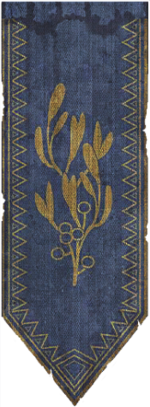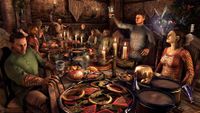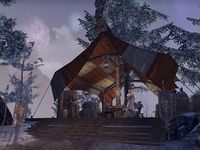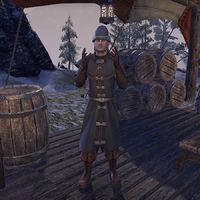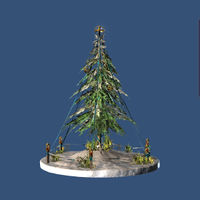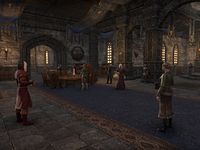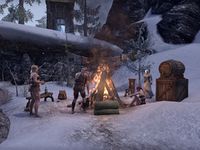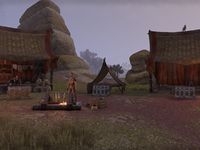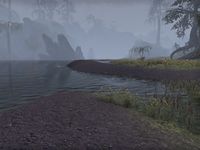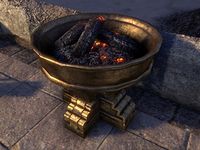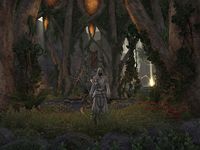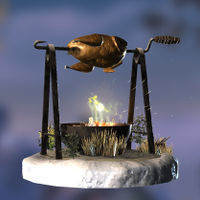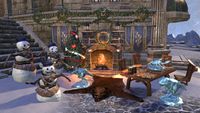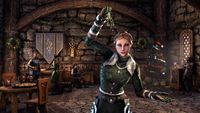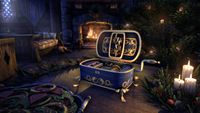Lore:New Life Festival
| To meet our site's higher standard of quality, this article or section may require cleanup. The user who placed this here had the following concern: Copyedit for grammar To leave a message about the cleanup for this article, please add it to this article's talk page. |
The New Life Festival (also shortened to New Life) is a Tamriel-wide event that celebrates the birth of a new year and the death of the old year.[1] In contrast to the Old Life Festival, New Life takes place at the beginning of Morning Star. It was originally the celebration of the sun god, Magnus, but over time it changed into a celebration of the gift of New Life, heralded by the sun.[2][3] The New Life Festival also marks the start of the Winter Solstice, when Magnus the Sun begins his return, and the days start to grow longer.[1] Almost all major races in Tamriel celebrate the New Life Festival in their own culturally unique way, and the celebrations themselves have been known to change over time. Many of the celebrations are symbolic of a historical event or have some deeper meaning. Celebrations include races, feasts, games, and dancing.[4]
The Breton holiday of Saturalia shares some elements with the New Life Festival, with it managing to become connected (or at some points synonymous with) the festival. This is thanks to the efforts of merchants from the trade hub that is Wayrest capitalizing on the holiday through consumer goods. Widespread adoption of Saturalia-themed trees, decorations, and more across Tamriel for usage in the New Life Festival make for a booming market during this time of year, touching even Tamrielans that grew up with their own New Life traditions.[5] This convergence of these Breton-influenced practices and aesthetics were started during the time of the Daggerfall Covenant,[5] and has carried onto the Fourth Era.[6][7]
In the Third Era, the reigning Emperor was known to give a New Life Address during this period, and many provinces observed the tradition of free ale in all taverns.[8] All across Tamriel, citizens from all walks of life take up the mantle of New Life Herald and offer assistance to people who wish to take part in the festivities.[3] Not everyone supports the festival, however. Some believe that engaging in such "frivolity and hedonistic behavior" in times of great peril is an affront to the teachings of Jhunal and Stuhn. Conversely, many merchants attribute a large portion of their annual income to the festival.[9]
Clavicus Vile's summoning day coincides with the New Life Festival.[8] The Serpent is also believed to hatch from a Celestial egg on this day, dropping its ivory egg tooth down to Tamriel and slithering across the sky for another year.[10]
Celebrations[edit]
Common traditional celebrations include food, drink, games, and dance. The Dunmer of Ebonheart celebrate the New Life with an act of defiance. When dancing was briefly outlawed in the city, the citizens found a way around it by inventing the Lava Foot Stomp. They called the dance a necessity should their boot ever catch fire and performed it in various taverns across town.[3] More devout Dunmer instead celebrate Triune, where they visit a temple and learn about the lives and lessons of their saints.[11] The Chimer's version of New Life was Born Anew, which primarily focused on Ancestral Worship and the veneration of the Good Daedra.[5]
The Breton holiday known as Saturalia is another celebration that heralds the New Life Festival and is held in Wayrest on the 25th of Evening Star. Saturalia shares many similarities to the New Life Festival; one is a shared tradition of elaborately decorating evergreen trees, topping them with a shining light ornament.[12] Despite being used in both Saturalia and the New Life Festival, these festive trees are dubbed Saturalia Trees.[6] Evergreen trees are chosen for their association with resilience and rebirth.[6] Gift giving is another shared tradition,[13] and gifts are placed under these festive trees.[14] The Bretons also celebrate the New Life Festival. The Alcaire Castle, after recovering from a bloody war, developed a New Life Festival tradition called the Castle Charm Challenge where participants must entertain the castle's inhabitants with a daring performance. This celebration gave the survivors a chance to heal and laugh once more.[3]
The Old Life Festival, primarily an Imperial tradition, compliments the New Life Festival. These festivals are considered two sides of the same coin based on the idea that to pass into the new year, you must acknowledge the old.[15] Dark tales and unsettling songs are told as part of the Old Life traditions to commemorate the shortening of the days. The Wolf That Craved the Sky is one of these stories and is considered relevant to the New Life Festival. It involves Storihbeg,[16] Hircine's Skinchanger aspect.[2] The Reachmen also celebrate the New Life Festival and acknowledge the Skinchanger.[17][18][19] Their version states that with the coming of the New Life Festival, two of Hircine's aspects come to conflict with each other. New Life marks the winter solstice, when the days begin to lengthen due to the return of the sun. Storihbeg the Man-Beast thus pursues the sun in an attempt to eat it and keep the nights longer. To prevent this, Reachmen summon Hrokkibeg the Mighty Bear to keep Storihbeg constrained.[16]
In the Nordic version of the tale, the Skinchanger has an endless hunger which once drove it to feast on the volcanoes of Morrowind and drink the Iliac Bay dry, thus creating the Alik'r Desert, before using Valenwood's trees for its oral hygiene. Seeing the moons untroubled, Storihbeg threatened to consume them. The agile Wolf claimed he could jump from the highest mountain to reach the moons, to which the moons responded that everyone would know they went missing. The Skinchanger said he could assume their forms, his eyes replicating their moonlight. But the moons then pointed out that the sun would know that the moons were no longer what they appeared. Storihbeg merely replied that he would eat the sun too, as well as all the stars. After his feast, the world would be filled with nothing but darkness, and he would then engulf the world and let out a howl. Yet the moons mocked the Wolf, stating that the sun's light is too rich of a meal. And so to prove them wrong, the Skinchanger waited for the sun to be at its weakest (when the Old Life Festival is celebrated), but the sun had other plans: it flared and burned bright (coinciding with the New Life Festival) and stopped the devourer in its tracks, sending it yelping away in pain.[2]
Bosmer immigrants to Auridon introduced the locals of Skywatch to the Mud Ball Merriment, a game where balls of mud are thrown at everyone. Each year, the Bosmer also agree upon a specific target that they feel needs to be humbled the most.[3] The Redguards of Bergama partake in the Signal Fire Sprint, a race to light several beacons around the city. This is to honor the sacrifice of an ancestor who saved Bergama from certain doom.[20]
During the Second Era, the Seamount Orcs of Betnikh celebrated New Life with a constant party known as the Stonetooth Bash. Food, drink, and festivities were at the heart of their New Life celebration.[3] Although the Orcs eventually lost control of the island and it was repopulated by Bretons,[21] a rotisserie chicken dish known as Stonetooth Bash Chicken became popularized across Tamriel and was still considered a New Life staple circa 4E 180.[22][23]
The people of Elinhir celebrate the tradition of "Secret Sanguine", where the identity of a gift giver is a mystery from the intended recipient. The gifts are promiscuous in nature, and are intended to dare the recipient into naughty acts.[16]
Not all celebrations are lavish, grand events. The Altmer of Haven celebrate through the simple act of charity. Known as the War Orphan's Sojourn, participants travel to a temple in the heart of Grahtwood and donate what they can, be it their gold or their time.[3] Similarly, the Argonians of Hissmir have the Fish Boon Feast, one of Shadowfen's oldest celebrations. Those who are able to fish bring back food for those who are unable. This is to remind them that it warms the heart to feed the hungry and help those who are truly in need.
The Khajiit of Rawl'kha celebrate the New Life Festival by honoring their trickster god, Rajhin, with the Trial of the Five-Clawed Guile. The challenge involves stealing coins from either locked boxes or the pockets of a previous winner. This shows the participant has as little regard for barriers as Rajhin did.[24]
More obscure celebrations include that of the Nords of Lower Yorgrim, who celebrate by traveling to remote places, stripping down, and leaping into freezing water, then drying off by a large fire among fellow participants. This is to show that they aren't afraid of what the cold brings, and that at the end of a winter's journey is a warm fire and good company.[3]
Maormer do not celebrate New Life.[4] New Life is not viewed positively by Vampires, Werewolves, and Undead, for the turn of the year means the eventual return of longer days, and so they dance in darkness in hope of hindering Magnus' return.[16]
Members of Akatosh Chantry wear ceremonial stoles made of silk and satin with embroidered hourglasses during ceremonies of the New Life Festival.[25]
Gallery[edit]
-
The New Life Festival in Eastmarch, 2E 582
See Also[edit]
- For game-specific information, see the Daggerfall, Elder Scrolls Online, Blades, and Castles articles.
Books[edit]
- From Old Life To New by Botjolf Meadwarmer — The tale of a mythical hungry wolf
References[edit]
- ^ a b Spread Holiday Cheer During The New Life Festival
- ^ a b c From Old Life To New — Botjolf Meadwarmer
- ^ a b c d e f g h Breda's dialogue in ESO
- ^ a b The New Life Festival quest in ESO
- ^ a b c Loremaster's Archive - Tamriel's Holidays — The Impresario
- ^ a b c Grand Saturalia Tree Decoration in Blades
- ^ New Life Festival event having Saturalia decorations in Blades
- ^ a b New Life Festival description in Daggerfall
- ^ Meet This Year's Officiate - Breda — Breda
- ^ The Serpent's Egg-Tooth
- ^ Interview with a Dark Elf
- ^ Saturalia Tree Decoration in Blades
- ^ New Life Festival Box on the official UESP ESO item database
- ^ Saturalia Grove Decoration in Blades
- ^ Petronius Galenus' dialogue in ESO
- ^ a b c d New Life Festival Interview — Countess Aurorelle Edrald, Marwig Yeomcroft, Priestess Phaziyya, and Mochtuinne Eye-Tooth
- ^ Crafting Motif 31: Skinchanger Style — Uraccanach the Witchman
- ^ Aspects of Lord Hircine — Juno Procillus, Academy of Chorrol
- ^ Appearance of The Hunter's Repose and Markarth during New Life Festival
- ^ Aubatha's dialogue in ESO
- ^ Betony in Daggerfall
- ^ Stonetooth Bash Chicken in Blades
- ^ Junius the Elder's dialogue in Blades
- ^ Tumira's dialogue in ESO
- ^ Akatosh Chanter's New Life Stole item description in ESO
